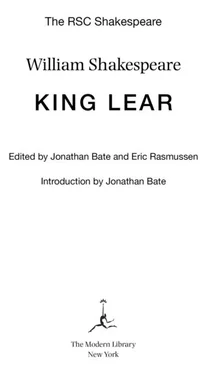уильям шекспир - King Lear
Здесь есть возможность читать онлайн «уильям шекспир - King Lear» весь текст электронной книги совершенно бесплатно (целиком полную версию без сокращений). В некоторых случаях можно слушать аудио, скачать через торрент в формате fb2 и присутствует краткое содержание. Год выпуска: 2011, ISBN: 2011, Издательство: Random House Publishing Group, Жанр: Старинная литература, на английском языке. Описание произведения, (предисловие) а так же отзывы посетителей доступны на портале библиотеки ЛибКат.
- Название:King Lear
- Автор:
- Издательство:Random House Publishing Group
- Жанр:
- Год:2011
- ISBN:978-1-58836-828-7
- Рейтинг книги:3 / 5. Голосов: 1
-
Избранное:Добавить в избранное
- Отзывы:
-
Ваша оценка:
- 60
- 1
- 2
- 3
- 4
- 5
King Lear: краткое содержание, описание и аннотация
Предлагаем к чтению аннотацию, описание, краткое содержание или предисловие (зависит от того, что написал сам автор книги «King Lear»). Если вы не нашли необходимую информацию о книге — напишите в комментариях, мы постараемся отыскать её.
King Lear — читать онлайн бесплатно полную книгу (весь текст) целиком
Ниже представлен текст книги, разбитый по страницам. Система сохранения места последней прочитанной страницы, позволяет с удобством читать онлайн бесплатно книгу «King Lear», без необходимости каждый раз заново искать на чём Вы остановились. Поставьте закладку, и сможете в любой момент перейти на страницу, на которой закончили чтение.
Интервал:
Закладка:
Noble:I think he takes upon himself the sins of others, in particular the sins of the father, in order to redeem himself. It’s a profoundly religious, spiritual journey that Edgar goes on and a very tough regime that he imposes upon himself. The disguises, flagellation, and infliction of misery are all part of that. Through the course of the play he cleanses himself. He’s like a character out of a George Herbert poem.
Nunn:Edgar does say, at a crucial moment of the play, at the moment where he could cease to be the Tom o’Bedlam character at last, “I cannot daub it further,” and then in the very next instant, “And yet I must.” In this production we’ve tried to identify something specific about that change of mind. There are men on Gloucester’s orders scouring the country on the hunt to capture and kill Edgar if they find him. We have a troop of those soldiers passing at that point, so Edgar’s “yet I must” is clearly justified as self-preservation, and by association the preserving of his father.
But there’s a deeper explanation that Edgar himself also provides when he takes Gloucester, who is suicidally bent, to an imaginary cliff edge. Just before the death plunge moment, Edgar has an aside to the audience, “Why I do trifle thus with his despair / Is done to cure it.” This is fundamental in Edgar’s journey. He observes that his father is now only full of resentment and hatred for the world, of believing that there was never anything worth believing in. Edgar, still clinging to his belief in divine justice, cannot allow his misguided, misled father to die a bad death or an unredeemed death. Therefore he makes it his mission to bring his father beyond suicidal thoughts to a different, reconciled set of attitudes. The gods seem to be unwilling to back up that reconciliation and continue to rain down horror, but Edgar’s changes of identity are entirely to bring his father to a better spiritual place.
There’s something of a fairytale quality to the play, isn’t there? Goneril and Regan as the ugly sisters, Cordelia as a Cinderella with an unhappy ending. But, especially since Peter Brook’s famous production and film, there’s also an approach to the play that emphasizes Lear’s unreasonable rage, the chaos caused by his riotous knights, and the sense that his daughters, Goneril especially, aren’t villains through and through.
Noble:It’s hard to really admire anybody in the play actually. You can like them all a lot, and you can feel for them a lot, but it is hard to admire anybody. You can admire Gloucester, and probably Edgar’s morality. As for the sisters, Shakespeare always writes what is needed. It can be very frustrating, especially for actresses, because it often happens with the female parts, that Shakespeare sees no point in showing you the bits of the iceberg under the water. He thinks that is a complete waste of scenes. It doesn’t mean that the bit that is revealed does not have a complete world of which it is a part. Exactly the same thing applies to Gertrude and Lady Macbeth, whereby when the function ceases to have a crucial element or a driving force, Shakespeare just stops. Lady Macbeth and Gertrude just stop. Actresses tend to think there must be a missing or lost scene, but there isn’t. Like the Fool in the second half of the play, it isn’t there because there’s no need for it. It doesn’t mean you can’t make it completely real, but you have to come at it from his time, not like a movie. The actor may have a backstory, but you can only show so much because you don’t need anymore.
Nunn:I think it would be wholly wrong for a production to suggest that Goneril and Regan are of evil disposition at the beginning of the play; but there is a degree of ambition in their behavior, and there is a degree of competition between them, and possibly there is that element of hidden resentment of how their much-the-younger sister has become the favorite of their old father.
Traditionally, late-nineteenth-century and early twentieth-century versions of Lear did indeed go very strongly for the interpretation that Lear himself was always to be seen as kind and gentle and white-haired and frail. And therefore a delightful old man goaded intolerably by two wicked sisters. When Peter Brook did his production in 1962, there was a sense that an extraordinary revolution had taken place because Brook, absolutely honest to the text, said: “Lear is behaving entirely unjustifiably, now he’s behaving appallingly, and now he’s behaving absolutely beyond the limit to the point where no father can expect to get away with that.” It was a production that tried explicitly to exonerate the sisters. I remember that, at that time, the impact of revealing Lear’s behavior as frequently unacceptable hit home very strongly. Now, of course, any production trying to propose that Lear is a close relative of Father Christmas would be laughed off the stage. The Brook view has become the standard view.
However, we do still have to explain how Goneril and Regan get to a condition of alarming ruthlessness in the second half of the play. All I will say is—especially if anybody hasn’t seen the play before—watch out for the moment when Lear utters his curse on Goneril, and particularly his curse on Goneril’s womb—a curse more bloodcurdling than I hope any lady in the audience will ever hear in her life. We all know that when dreadful things are said in rage, those words can never be unsaid. This is a major turning point of the play and causes Goneril to become vengeful, regardless of consequence.
The blinding of Gloucester is perhaps the most horrific moment in all Shakespeare. How did you stage that and did it have contemporary resonances for you? In Trevor Nunn’s 2007 production Regan behaves with sadistic glee that’s also a kind of fear—it inevitably conjured up the American soldiers in Abu Ghraib jail in Iraq. Torture in times of war is something that just doesn’t go away …
Noble:Yes, it had resonances in the sense that it confronts you with the most shocking things that humanity can do to humanity, but I almost never make references to contemporary events, because in my view it’s a blind alley. Scenes like that talk directly to the audience and their souls and hearts. You don’t need people coming on in flak jackets and dressed as Iraqis.
It is a dangerous scene for a number of reasons. It’s dangerous because the blinding is done to an old man, and secondly, it’s completely plugged in to this extraordinarily dangerous sexual relationship between Cornwall and Regan. It’s plugged in to the scheme of the play in terms of the breakdown of order and the dawn of chaos. It’s a wild, very, very unpleasant scene.
Warner:The theater is a very safe place to explore the taboo and the pornographic. That safe place of examination may be the very point of theater. As a theater director, if you have to do a blinding you want to make it as ghoulish as you can. The audience is then left working it through in the safety of the evening, and a live and engaged audience will inevitably draw contemporary parallels. All great plays have the power to do this and the greater the performances the greater that power to prompt connection. This brings us back to what I said about these plays flowing through our imaginations. Few of us experience directly something like the horror of Abu Ghraib, but the theater allows us to imagine such a reality, to process it, and to question it from every angle. The Greek theater was a public debate where the audience tested their response to the barbaric and nudged toward a legal system and the founding of modern democracy. Shakespeare’s theater took this debate into the newfound world of the seventeenth century and put up onstage every single human emotion, so that we could have a place to go where we might discuss ourselves. Sometimes one can view Shakespeare’s legacy as the complete human emotional encyclopedia. A place to go to study each and every human experience—to map ourselves in the safety of the theater.
Читать дальшеИнтервал:
Закладка:
Похожие книги на «King Lear»
Представляем Вашему вниманию похожие книги на «King Lear» списком для выбора. Мы отобрали схожую по названию и смыслу литературу в надежде предоставить читателям больше вариантов отыскать новые, интересные, ещё непрочитанные произведения.
Обсуждение, отзывы о книге «King Lear» и просто собственные мнения читателей. Оставьте ваши комментарии, напишите, что Вы думаете о произведении, его смысле или главных героях. Укажите что конкретно понравилось, а что нет, и почему Вы так считаете.












